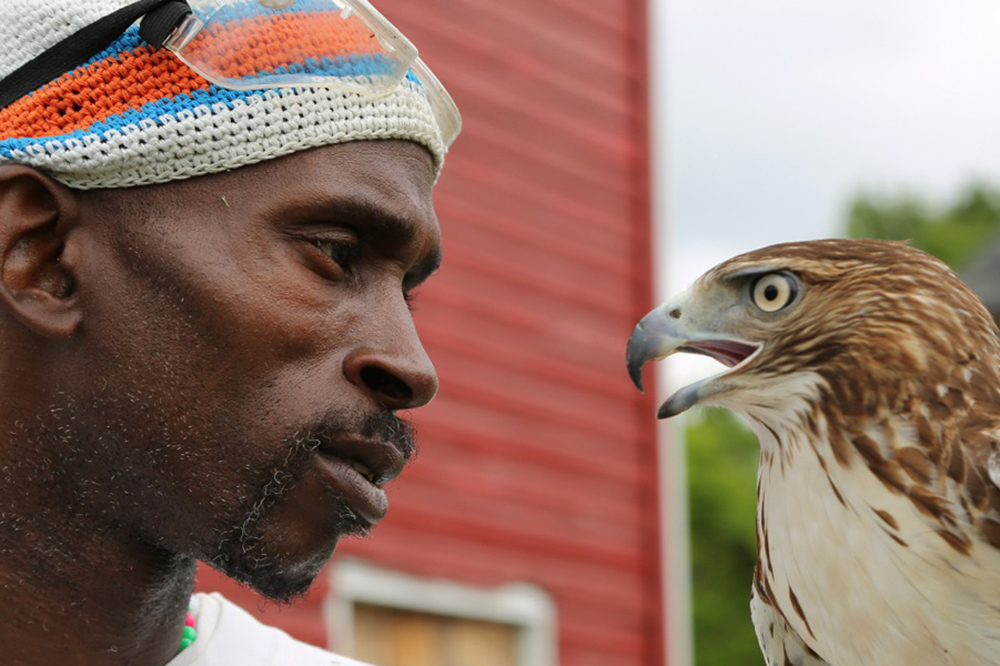Culture
 Still from the film "The Falconer." Photo courtesy of DCEFF.
Still from the film "The Falconer." Photo courtesy of DCEFF.
DC Environmental Film Festival Transitions Online
March 18, 2021 @ 10:30am
Just about a year ago, The Environmental Film Festival in the Nation’s Capital (DCEFF) was one of the first events to be cancelled due to COVID-19,. But after a year of planning, the group is back –– virtually, that is. From March 18th to March 28th, the festival will celebrate its 29th year completely online. Rather than gathering in the various partner venues throughout the D.C. area, as it has done in past years, the festival will be organized through a platform called Eventive.
“It’s become the gold standard for festivals,” Director of Programming Brad Forder explains. “What Eventive allows us to do is stream a film, and we can integrate Zoom. You buy a ticket, the day of the event you would click on the ticket, and then it would show up on the Eventive page, and from there you can stream it from your laptop, computer, or if you have an app you can run it through your television.”
Forder also emphasizes that while the screenings are virtual, the festival staff has been working hard to make the experience as close as possible to what it would be in person.
“One of our goals this year was to try to transfer as much as we can from what the in-person event looked like into the virtual space,” Forder says. “We will have live events running throughout the festival, almost every day of the festival we’ll have some sort of discussion that is streamed live and people will be able to respond to. We’ll be using Zoom for that, and we’ll also be using Facebook Live.”
One positive side to being all virtual? The festival’s reach can be wider.
“There are some silver linings in building this virtual festival,” Forder says. “One is that we can cast a wider net and get beyond D.C. borders, across the U.S. and even internationally. I’m able to connect with more international filmmakers and special guests.”
While some screenings cost $10 and all-access passes are available for $45, the festival also provides a variety of free programs. As filmmaker and DCEFF Board Member Annie Kaempfer explains, this makes the content more accessible for those who may not have the ability to pay for admission.
“Another thing I really appreciate about the festival is that a lot of their films are free to the public, which is not something most film festivals do,” Kaempfer says. “A lot of film festivals are into being as exclusive as possible, and I feel like the EFF has always embraced the idea of inclusivity and [tried] to make the films that are so important for the future of our planet available to everybody, not just those who can afford a ticket.”
Klaempfer finds this especially important given the context of her film, The Falconer, which follows master falconer Rodney Stotts as he builds a bird sanctuary in Laurel, Maryland. By not requiring the audience to pay to view the film, Kaempfer hopes its message can be absorbed by more people.
“After spending so much time witnessing the impact that Rodney has on the people that meet him, you just see the light go on in their eyes and it’s so inspiring to see how excited they get,” Kaempfer says. “One of my hopes it that the film can extend his reach and that this can let people know that falconry is an option if you’re interested in that.”
Kaempfer also notes how her film could help educate others about crucial topics.
“After the incident in Central park with Christian Cooper, I’ve become aware of the need to celebrate Black visibility and resilience in the outdoors,” Kaempfer says. “I hope the film can be used as a tool by the people and the organizations who are doing the work on the ground to move the needle on some of the important issues.”
Forder also emphasizes the ability for films to advance the public’s understanding of environmental issues, and that this will still be evident in the festival’s online format.
“One of our missions from the beginning with this festival is to advance understanding and stewardship for the environment through film,” Forder remarks. “Film is a great tool, it inspires and educates. We want to present a wide range of films but we also want to touch on these pressing and relevant environmental issues. Even in this virtual space, we’ll have over 100 films that reflect those two values and we’re looking forward to it and looking forward to sharing all these filmmakers’ work.”
The film festival begins March 18th and ends March 28th. For more information, visit https://dceff.org and follow @dceff_org on Instagram. For more on “The Falconer,” visit www.thefalconerfilm.com.
Enjoy this piece? Consider becoming a member for access to our premium digital content. Support local journalism and start your membership today.







